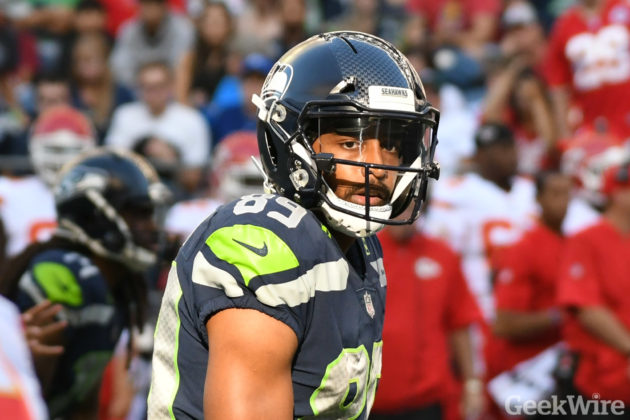Vicis is back.
The one-time Seattle startup darling that went through a major and sudden downfall in 2019 just debuted a new-and-improved version of its high-tech football helmet called the ZERO2.
The launch marks a milestone in what’s been a roller coaster for Vicis over the past few years.
After spinning out of the University of Washington in 2014, Vicis garnered attention for its unique ZERO1 helmet that featured specialized layers built to mitigate the impact of bone-crushing hits that cause concussions and put the health of professional football players in jeopardy.
It raised more than $85 million over five years from more than 400 investors such as current and former NFL players Aaron Rodgers, Russell Wilson, Doug Baldwin, Alex Smith, Roger Staubach, and Jerry Rice.

But even as the helmet gained traction from NFL stars and NCAA teams — Kansas City Chiefs quarterback Patrick Mahomes still wears the company’s helmet, and will do so at Sunday’s Super Bowl — Vicis ran into several problems over the past few years.
Insiders say the company put too much focus on grabbing market share from incumbents rather than turning a profit, among other issues. The troubles came as a surprise to some shareholders. Vicis was unable to raise more cash before shutting down the company and laying off more than 100 employees in December 2019.
Last year a New York City investment firm purchased the assets of Vicis out of receivership for less than $3 million and formed a new company. It helped bring back a small group of early Vicis engineers and marketers who built a second version of the company’s helmet that just debuted Tuesday.
Jason Neubauer is a longtime Vicis product development chief who is now managing about ten Vicis employees in Seattle. He said his team is carrying forward Vicis’ original mission of protecting athletes and improving the safety of contact sports.
“We wanted to do it for those people that left all their blood, sweat, and tears to get us to where we’re at,” Neubauer said. “It’s been really rewarding to feel like we’re completing that mission that we all started out on together.”
Vicis has maintained its brand under the new owner, Innovatus Capital Partners. The firm late last year formed an LLC called Certor Sports to acquire sporting goods brands, including many that have struggled during the pandemic.

Innovatus, which has more than $1.5 billion in assets under management, previously invested $18 million in football helmet leader Schutt and used Certor to buy the remaining shares in the company from Kranos Corporation.
Innovatus is now using Schutt’s manufacturing capabilities to produce the Vicis helmet, as well as its sales and distribution channels. That’s one of many tweaks to Vicis’ business and manufacturing model.
“We are way more efficient,” Neubauer said.
The ZERO2 is the result of feedback Vicis received from players and equipment managers over the past three years. It is 15% lighter than its predecessor; has improved fit and comfort features; and gives the player enhanced field of view.
The helmet also maintains the innovative deformable outer shell designed to absorb impacts to the head, and ranked No. 1 — higher than the ZERO1 — in Virginia Tech’s latest helmet safety ratings. Vicis also figured out how to lower the price of the helmet — it starts at $699; the ZERO1 debuted at $1,500 — without sacrificing quality.
Neubauer said nine NFL teams have already received samples of the ZERO2. Vicis plans to release additional sizes and a youth version of the helmet later this year.
The pandemic continue to present challenges for sporting goods manufacturers as leagues put games on pause.
“It has been a very challenging environment and we expect some rocky roads ahead,” said Jeff Holland, vice president with Innovatus. “However, we’re confident that there is a tremendous desire to return to competition, a never-ending demand for better performing products, and we expect an epic bounce in activity as the vaccine rolls out and restrictions continue to ease.”
Holland said there are plans to roll out new Vicis products for additional sports in the future and he expects the Seattle team to continue to grow.
“We are excited about the opportunities that come from the intersection of health and safety, technology, and sports,” Holland said.
Vicis was originally founded by Per Reinhall, former chair of the UW’s mechanical engineering department; Samuel Browd, professor of neurological surgery at the UW; and former CEO Dave Marver, who stepped down in November 2019. Marver is now CEO at Onward, a medical device company based in the Netherlands. UW engineering professor Jonathan Posner is another co-founder; he left the company in 2015.